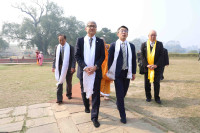National
Province 2 to review bill on Madrasa Education Board
Following widespread criticism, the Province 2 government has decided to review the bill on formation of Madrasa Education Board which, against the constitutional provision, envisioned seeking financial support in gift or grants from domestic or foreign organisations and individuals to fund the Muslim schools.
Binod Ghimire
Following widespread criticism, the Province 2 government has decided to review the bill on formation of Madrasa Education Board which, against the constitutional provision, envisioned seeking financial support in gift or grants from domestic or foreign organisations and individuals to fund the Muslim schools.
The government on Friday forwarded the bill to the Bill Committee of the Provincial Assembly for review. The bill, say some critics, was introduced to woo the sizeable Muslim population in the province whose Chief Minister Mohammad Lalbabu Raut is a Muslim. It was tabled in the assembly when Social Development Minister Nawal Kishor Sah, who is against the several provisions in the bill, was abroad. He is the line minister taking charge of education in the province.
The new bill proposing foreign funding for madrasas, not only contradicts the constitution, but also poses serious implications for national security, as most madrasas are located in areas close to the Nepal-India border. The growing number of madrasas across the border has been a routine security concern for New Delhi.
“The bill will be tabled in the assembly after correcting the controversial provisions,” Sah told the Post. “The bill cannot be endorsed in present form.”
The Raut-led government agreed for the revision after ministers from his own cabinet and members of the Provincial Assembly stood against the provision of inviting international funding to support the madrasas. A majority of madrasas operating in the Tarai region are reluctant to register with the authorities despite frequent calls from the government.
A total 907 madrasas that focus on Islamic teaching, along with Urdu and Arabic languages, are registered with government agencies, which officials say is less than one-fourth of their total number. Though Muslim organisations say there are around 2,000 madrasas in the country , Zaheed Pervej, a Tribhuvan University professor who has researched extensively on Nepali madrasas, said there are about 4,000 Muslim religious schools.
On May 24, 2002, the government issued directives to all the district education offices to make sure that madrasas are registered immediately. The government also granted financial aid to those who complied, on the condition that they teach science, mathematics, English and Nepali along with the religious subjects.
Pervej’s researches show that a majority of madrasas are operating without maintaining transparency which is the main reason behind the Muslim schools’ managers reluctance to get their schools registered. They fear that they will need to disclose their sources of funding which largely comes from the Gulf countries, according to Pervej.




 9.12°C Kathmandu
9.12°C Kathmandu















